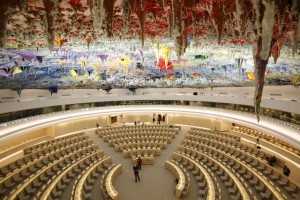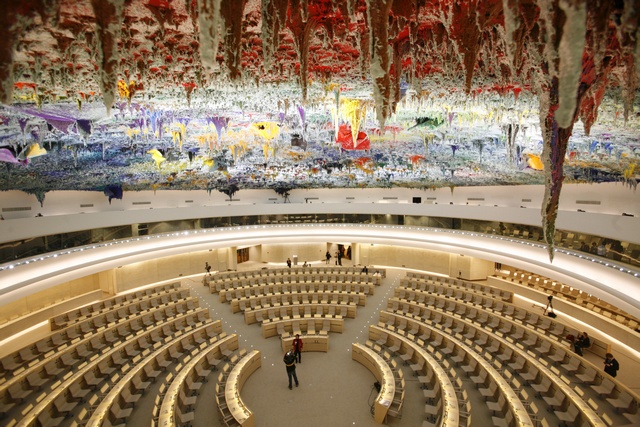
© 2008 Reuters
Today, Monday June 18, marks the inauguration of the proceedings of the 20th session of the United Nations Human Rights Council (HRC) in Geneva; the session is scheduled to conclude on July 6, 2012. This session witnesses a review of a number of reports submitted by UN Special Rapporteurs (international thematic experts) on a set of rights including the right to freedom of opinion and expression, the right to peaceful assembly, independence of judges and lawyers, and the promotion and protection of human rights while countering terrorism.
The Cairo Institute for Human Rights Studies (CIHRS) takes advantage of the independent experts’ reports, scheduled for discussion during the session, to submit its interventions and observations on the human rights situation across the Arab countries. The system of the HRC allows nongovernmental organizations (NGOs) to engage in shedding light on the human rights situation in different countries and in confronting governments with their violations of such rights. NGOs engage directly in the proceedings of the sessions through a system of interventions, either written or oral. CIHRS enjoys a consultative status which qualifies it to submit interventions and reports to the Council.
On June 19, the Council will discuss the report submitted by Mr. Frank La Rue, UN Special Rapporteur on freedom of opinion and expression. In his report, La Rue focuses on violations committed against journalists and documents a “notable trend” in the increase of the scale of violations against media workers in Egypt, Sudan, Iraq, Yemen, Libya, Syria and Tunisia. Throughout the last year, the Special Rapporteur has issued several statements expressing concern with regards to violations against journalists in Egypt, Libya, Algeria, Syria, and Bahrain, in addition to communications sent to the governments of Egypt, Sudan, Yemen, Iraq, Libya, and the United Arab Emirates regarding specific violations of the right to freedom of opinion and expression in those countries. The report additionally includes restrictions on journalists disseminating their work through the internet, and refers to policies and practices taken by a number of governments to provide impunity for violations.
In this regard, CIHRS submitted 2 written interventions to the Council’s session addressing defamation of religions laws in the Arab world and freedom of the media and the rights of journalists in Egypt. The latter intervention focuses on the most prominent violations documented against media personnel in Egypt since the revolution, and repression mechanisms used against the exercise of the right to freedom of expression and opinion and freedom to impart information. In the intervention, CIHRS expressed concern over the rise in the nature and scale of violations targeting the media sector in Egypt under the rule of the Supreme Council of the Armed Forces (SCAF), which included direct violent attacks against media professionals, legal measures against journalists and bloggers – in some cases leading to prison sentences – storming offices of independent media outlets, closing down satellite channels, imposing restrictions and interfering in the editorial policies of certain papers, dominance of certain media sectors, and preventing some programs and presenters from airing. These violations are fostered by an atmosphere of legal impunity aided by an arsenal of draconian laws, which are yet to be reviewed or amended.
In another intervention addressing association laws in North Africa, CIHRS stressed the importance of urgently reviewing legislation and practices regarding the right to freedom of association. It further said that “despite the fact that the recent revolutions and promises of reform across the region have to some extent offered new opportunities to bolster this freedom in both law and practice, it is also true that this period has seen an escalation of restrictions and attacks against civil society organizations and their members in many of the states in the region.”
On June 20, Mr. Maina Kiai, The Special Rapporteur on the right to freedom of peaceful assembly and association will also present his report for discussion at the Council. The report outlines effective measures and best practices to secure the right to assembly and association. The report shed light on governments’ responsibilities to protect peaceful protests and promote the right to freedom of association.
During the interactive dialogue with the Special Rapporteur at the Council, CIHRS plans to submit an oral intervention dealing with violations in the context of peaceful protests across the Arab world and tools of protection from these violations. On Friday June 22, CIHRS will also organize, in collaboration with a number of international organizations, a side event at the Council entitled ” Freedom of Assembly and Association: Countering Persecution and Pushback on Civil Society.” The event features the Special Rapporteur, Mr. Maina Kiai, as a speaker in addition to a number of human rights defenders from Arab and international human rights groups.
Additionally, on June 25, Ms. Gabriela Knaul, UN Special Rapporteur on the independence of judges and lawyers, whose mandate covers the right of civilians to be referred to civilian courts, will discuss her report at the HRC. The report focuses on the role and independence of prosecutors. The report also provides a set of recommendations including the need to set criteria for the selection of the Prosecutor General, in a way that gains “public confidence and the respect of the judiciary and the legal professions.” The Special Rapporteur also raises concerns regarding the impartiality and independence of military prosecution and recommends- without exception- that “when the offense committed amounts to a human rights violation, or when the matter involves a civilian, the case must be referred to civilian jurisdiction.”
In this context, CIHRS submitted a written intervention jointly with the No to Military Trials for Civilians Group, outlining the increasing numbers of civilians referred to exceptional tribunals in Egypt; the patterns of charges brought against them; the legal flaws which allow the referral of civilians to military trials; in addition to major violations committed by military personnel against civilians throughout the last 18 months. The joint intervention echoed grave concerns over the continuously increasing, almost systematic, practice of referring civilians to exceptional military tribunals in post-January 25 Egypt. It further referred to the fact that mass arrests are usually conducted by military personnel following protests whereby Military Police intervene to quell protests using violence, in many incidents lethal, and conduct random arrests.
On Bahrain, CIHRS continues its efforts, which started since February 2011, to put the continuously deteriorating human rights situation in the country on the HRC agenda. Since the beginning of mass pro democracy protests across the Arab region, the Council’s reactions have been shaped by selectivity and double standards vis-a-vie the violations and countries it addresses. This appears vividly in the case of Bahrain, where the HRC remains silent on ongoing violations committed in the country since the beginning of last year.
In addition to submitting a written intervention, jointly with the Bahrain Center for Human Rights (BCHR), CIHRS is engaged in an international initiative adopted by a number of regional and international NGOs to call on HRC member states to immediately address the dire situation in Bahrain. In their joint written intervention, CIHRS and BCHR said that “Since the outbreak of mass pro-democracy protests in Kingdom of Bahrain in February 2011, the situation of human rights has witnessed severe deterioration, as violations against protesters continue on an almost daily basis amid deafening silence from the UN Human Rights Council.” Despite the establishment of the Bahrain Independent Commission of Inquiry (BICI) in June 2011, which presented its findings and recommendations to the King in November, the government has failed to implement nearly any of the Commission’s recommendations.
Moreover, on Tuesday June 19, CIHRS will co-host, in cooperation with the Gulf Centre for Human Rights, the BCHR, the Bahrain Youth Society for Human Rights, Human Rights Watch, and the International Federation for Human Rights a side event entitled “Bahrain : Reforming Repression” at the HRC headquarters in Geneva. Speakers at the event will discuss recent violations in Bahrain, including the recent attacks on pro-democracy demonstrations, ongoing threats to the health sector, and the targeting of human rights defenders and democracy advocates. Speakers will also examine the government’s compliance with implementing recommendations of the BICI.
As for Syria, CIHRS will continue its engagement to push the international community to stand up to its responsibilities of protecting civilians an ensuring accountability for major human rights crimes. CIHRS plans to participate in an interactive dialogue on the UN Commission of Inquiry report on Syria, where it will renew its demand to ensure that the Security Council refers the case to the International Criminal Court.
During the last week of the session, the HRC will examine the situation in the occupied Palestinian and other Arab territories. On July 2, CIHRS will submit an oral intervention on the situation of human rights in the Occupied Palestinian Territory, focusing on the continuous suffering of Palestinian political prisoners in Israeli prisons, as well as following up on the resolution adopted during the last session of the Council addressing the illegal expansion of Israeli settlements in occupied Arab territories.
With 47 member-states, the Human Rights Council is the primary UN body concerned with human rights issues. It holds three sessions annually to discuss human rights in various countries. The council began operations in 2006, holding its first session on June 19, 2006.
- Please find attached the written interventions submitted to the 20th session of the HRC.
- “Defamation of Religions” in the Arab world.
- Addressing the unremitting silence on human rights crimes committed in the Kingdom of Bahrain.
- Freedom of Association Legislation and Practices in North Africa.
- Media under attack The status of freedom of expression under military rule in Egypt.
- Military Trials of Civilians in Egypt since the January 25 Revolution.
Share this Post

